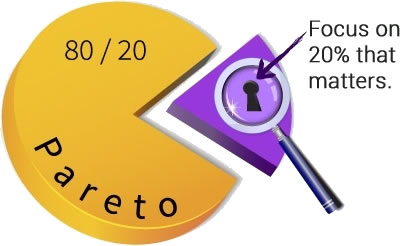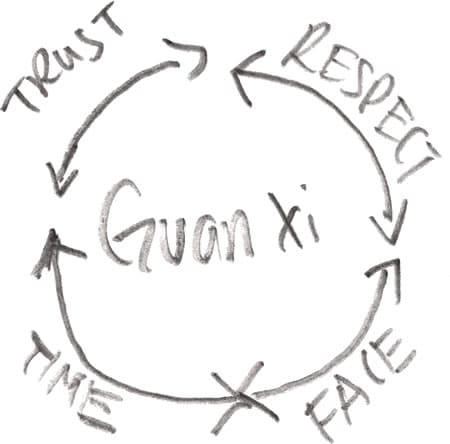This post is by Gary Huang of 80/20 Sourcing.
If you’re an Amazon private label seller or an ecommerce brand, how do you find the best private label manufacturers for your business?
Ones that make products at the right quality and the right price, provide the service you need, deliver on time, make the modifications you want, and manufacture them under your brand.
First things first: 80/20 rule
It’s just like the dating game, where not every guy or girl will be the right fit for you. The same rule applies when you’re looking for private label manufacturers.
I estimate that only 2 out of every 10 manufacturers that you contact will be suitable suppliers to your business. In other words the 80/20 rule (or Pareto Principle) applies – the law of the “essential few” and “trivial many”. The essential few in this case are the rare suppliers that are a good fit for you and your business.

Let’s break this down.
First off, as you send requests for quotations (RFQs), you shouldn’t expect all of them to reply to you. Out of the ones that do, there may be a wide range of product qualities and prices, outside of your expectations. Some factories may be too small for your business and won’t be able to meet your demands.
Other manufacturers may be too big and simply not interested in your business. They would rather move dozens of containers per month with clients like Walmart, so won’t be interested in dealing with small guys like the typical Amazon seller, or ecommerce business owner, who is only providing a fraction of their business.
And finally, some manufacturers may be able to deliver the product but don’t have the service, support, or language skills to back it up.
Your job is to find the best private label manufacturers for YOUR business.
What makes a good private label manufacturer?
In my years of sourcing products from China, from multimillion dollar sourcing campaigns to custom products for my own private label business, I have found that good private label manufacturers have these characteristics.
1. Experience with the product
Not only does the factory need to have the capability to manufacture your product, they also need the experience in manufacturing your product. As you evaluate suppliers ask yourself:
- Are they rookies or veterans in this area?
- Have they manufactured this product before?
- Can they provide samples of their past work?
Ideally a good private label supplier will have made the product you want in the past. If they’ve never made it before, you certainly don’t want to be their “guinea pig” as they make this product for the first time, right?
2. The right level of quality
Also ask yourself, “Is there a quality match?” If you are sourcing umbrellas, for example, there’s more than meets the eye. Umbrellas look the same at first glance, but there are your 99-cent store variety that break the first time they’re out in a large gust, and there are sturdy ones that can cope with even the strongest storms.
What level of quality do you need? You want to find a supplier whose manufacturing matches that. Too low, and your customers will be dissatisfied. Too high, and the price will be unaffordable.
3. Familiarity with your market
Find out which countries your potential suppliers export to. Different countries have different quality standards, different style and color preferences, and different nuances that their marketplaces demand. If you’re selling on Amazon.com, then it makes sense to find a supplier that has experience exporting to the US.
They are also likely to be more familiar with your market’s product standards and preferences. For example, in fashion and apparel, the clothing will have to be cut and sized larger for US markets than for Asian markets. If a supplier has only made clothing for Japan, you should be careful when sourcing their clothes and expecting them to fit American body types. Modifications are likely to be needed.
If, on the other hand, a manufacturer typically exports to developing countries in Africa, I would be careful about the quality, because those markets often value PRICE over quality. In other words: lower cost but also lower quality. If the quality is below the level your market expects, your buyers will be disappointed.
4. Ability to brand products
Is your supplier willing and able to private label your product, within your order volumes?
Some manufacturers are only willing to make products under your own brand if you hit a high MOQ (minimum order quantity). Those would not make for the best private label manufacturers if you’re just starting out.
5. Pricing in the right ballpark
In China these days, costs are rising due to a combination of:
- Rapidly increasing labor costs
- Increasing material costs
- Chinese currency appreciation
- Stricter environmental policies
The new controls on pollution have had a huge impact, causing tens of thousands of factories to shut down.
So quotes may be higher than you expected, but you may still find a wide range of prices provided in response to your RFQs. All factories are subject to these rising costs so, if one manufacturer is quoting way below the average, they are either cutting back on something that really makes an impact, or it’s not a genuine quote.
6. Socially responsible manufacturing
Some private label sellers are rightly concerned about factory conditions, and want to make sure they are doing business in a responsible way.
The most direct way to check for this is to have the factory audited. But that is not always feasible for a startup business.
A less expensive option is to check if they have worked with large multinational companies, that will have already done the legwork to ensure good working conditions. For example, if I’m looking to source umbrellas and I’m worried that a factory may be operating under dubious conditions, I would ask them who they’ve worked with in the past. If they claim that they have manufactured for Disney or Target, then that is a good sign. These companies have their own standards which factories much pass before they agree to do business together.
I would ask for the factory to show a certificate or report of this as evidence. If they can produce that I would feel more comfortable. It is not a 100% guarantee, but it is one way that you can quickly size up a factory’s standards instead of hiring a factory auditor straight off the bat.
7. Holding a valid export license
Another important factor is to check if the manufacturer has an Export License. In China it’s against the law to export products (ship them overseas) without a license.
If your factory does not have one, you will have to resort to a third-party “trading company” to help them export the product. This will add a layer of bureaucracy and additional fees.
If a manufacturer has their own export license that is a good sign that they can work directly with you. Moreover, depending on how long they’ve owned an export license, it means they are more likely to understand the entire export and shipping process which will smooth things over for you during shipping.
8. Good communication skills
Does the supplier have good communication? Are they punctual in replying to your questions? Do they reply within a 24-hour window?
Is their English good enough so they to understand you, and you can understand them? If you need to hire outside help to ask product questions and request modifications, that’s a sure sign of more trouble to come later.

9. Flexibility
Is the manufacturer cooperative? Are they willing to accommodate your requests?
Smart private label sellers don’t sell “me-too” products packaged in a poly bag. They make modifications to improve the product and one-up their competition. They create modified packaging with logos, artwork, and branding to increase the perceived value of their products.
In theory this is great, but in actuality it can be a headache for Chinese suppliers. I find that most of them are resistant to change. It’s human nature. If you’re comfortable doing something a certain way, then it becomes very hard to change your habits.
So not all suppliers may be willing or able to make the modifications you want. They may have other clients who are ready to purchase their products AS-IS, which is of course easier for them.
The best private label manufacturers are those that are flexible and willing to accept your changes within your order volumes. Most private label sellers will place a low quantity trial order of 500-1000 units and not all suppliers are willing to invest in making modifications for such a small order, unless you can convince them of why they should.
Many suppliers that I’ve worked with have told me flat out that they are not making money on the first order with us, because they are investing in the future of our business relationship together. As order volumes grow, they can leverage economies of scale to make it a profitable business for both sides.
10. Wanting your business
After exchanging emails, getting a sample, and possibly even visiting the factory, ask yourself are they HUNGRY for your business? Or are you small potatoes in their eyes?
You want your partner to be interested in you. If they are, that’s a good sign they’ll be more willing to make an effort when trouble arises, or when you need to make more changes to stay ahead of competitors.
Understand guanxi

Do you have a strong relationship with your supplier? Were you referred to them (or them to you) by someone you trust?
In Chinese culture, the fabric of society is based on social relationships. The credit check system used in the West is not mature, and it’s very difficult to run an accurate background check on a company or an individual. Traditionally most relationships are built on trust and start from referrals.
One of the best ways to build a relationship quickly is to not only to place an order with them, but also to visit their factory. Most of their clients will NOT make an effort to do this. If you meet with the owners, give them some “face” time and have a meal with them. This will add a lot to your “guanxi” and may pay dividends in the future. For example, if you’re running out of stock and are pressed to deliver to a tight deadline, they may be able to do you a favor and expedite your order ahead of the production queue.
Of course, there’s no guarantee, but investing in relationships will definitely increase your odds of business success in China.
Factory or trading company?
Should you always work directly with the manufacturer, or go through a trading company acting as a middleman?
This is an age-old question, and all the aspects to consider are beyond the scope of this article. But, given a choice, I prefer to work directly with factories, because I know who I’m dealing with and I can control the communication.
When working through trading companies, the advantage is supposedly better communications and the fact they may be able to find factories that you cannot. They might also help negotiate better prices and terms, and ensure quality control.
But as Murphy’s law states, whatever can go wrong, will go wrong. At the end of the day, if something goes sideways with the order, do you know whose side the trading company will be on? Yours, or the manufacturer’s?
Where should you look for private label manufacturers?
Online: Alibaba and Global Sources
Buying from Alibaba is an obvious choice, since they are the world’s largest online directory of factories and other suppliers. It’s a great starting point.
However, not all suppliers are listed on Alibaba. Why not? Alibaba has a reputation for being dominated by trading companies, and manufacturers are aware of this. Many suppliers also believe that the quality of buyers on Alibaba can be poor. When listing on Alibaba they can get over 100 requests per day all saying, “Give me your lowest price” and “What’s your MOQ?” So they may decide to advertise elsewhere…
Enter Global Sources. I’m surprised how few people use Global Sources. They started their business many years before Alibaba and run trade shows in Hong Kong as well. While their selection is not as big as Alibaba, I find that in certain categories they offer a deeper and higher quality range. These include electronics, fashion and accessories, and home and gift products. If you get a chance to visit their trade shows in April and October in Hong Kong I recommend it.
For more on Alibaba and Global Sources check out my post Alibaba Alternatives: 10 Other Ways to Source Products from China.
Where NOT to look online
1688.com is getting more attention these days as private label sellers look to find suppliers beyond Alibaba. This is a Chinese platform for business-to-business wholesale purchasing. It is actually owned by Alibaba, but tailored to the domestic Chinese market (not for exporting overseas).
But I do not recommend 1688.com for private label sellers for several reasons.
First of all, suppliers on this site cater to the Chinese market. In China, products for export are of HIGHER quality than products for sale within the country. Many Chinese bricks-and-mortar shops will advertise as selling “export quality” clothes, shoes, etc. as a way of telling customers that their products are of better quality. If you use 1688.com then the quality level may be lower than what you would normally expect.
Secondly, the suppliers listed on 1688.com typically don’t have an export license (see above). You will probably need to hire a trading company or other agent, with an export license in China allowing them to legally ship the product overseas. This adds more complexity and cost to the business.
Finally, there is the language barrier, because the site is 100% Chinese and tailored to the Chinese market.
I do see some benefits to 1688.com if you absolutely cannot find your product elsewhere, or if you want to do a price comparison. But be aware that the prices listed on the site are not going to be the FOB costs (free on board – delivered to a Chinese port) you will get from a supplier that has experience with exporting.
I would also stay away from lesser sites such as DHgate and Made-in-China.com because most of the suppliers found there can also be found on Alibaba and Global Sources. I don’t know anyone that relies on these smaller sites for serious product sourcing. Remember the 80/20 rule and focus on the “essential few” to get exponential results.
Now that you know what to look for in private label manufacturers, and where to look for them, you might be asking, “How should I contact them so that they take me seriously?”
Requests for quotations
A request for quotation, or RFQ, is where you set out everything a supplier needs to know about the products you want to order, so they can provide you with an accurate price.
Many private label sellers make fundamental mistakes with their RFQs, so here are the most important factors to consider.
Be specific
I attended a presentation by a panel of Chinese suppliers and they were asked, “What do you look for in a buyer?” A common theme was that the buyer should be very specific in their RFQ.
Just as you are evaluating different suppliers to do business with, they are also evaluating you! By being very specific in your requests you will demonstrate that you are serious about doing business, and are not just a looky-loo blindly sending RFQs on Alibaba.
Prepare your RFQ properly by including the following elements:
- A short company introduction – where your company is based, which markets and categories you’re selling in, and anything else that sets your company apart.
- Order volumes – what’s your annual purchase volume estimate? How many pieces are you looking for in your initial trial order?
- Product specifications – this should include measurements with accepted tolerances, drawings, materials etc.
- Modifications – what changes or improvements are you looking to make to the product?
- Product labeling and packaging – if needed, you should include this as well.
- Pictures – they say a thousand words, regardless of your mother tongue.
By putting together a detailed RFQ you will look more professional than most other prospective buyers, and this will increase your response rates.
How should you contact them?
First, send your request for quotation through the online platform you are using (Alibaba or Global Sources). Then, once I have a good feel for the supplier, I prefer to move the conversation onto email so it’s easier to manage.
Later on in the process, the most useful app to communicate with Chinese suppliers is WeChat. Everyone in China (and their grandma) is on WeChat, so this is often the best way to send over quick questions. Even if they’re on vacation, they will still check their WeChat!

It’s also a great way to send pictures and videos, and make free voice and video calls. You can even take a virtual tour of their factory, or have them show you a problem with your product that they have a hard time describing over email.
What should you ask?
It sounds obvious, but the number one question to get absolute clarity on is, “Can they manufacture this product?” If they can, then keep going. If they can’t, then move on to someone else.
Look back over What makes a good private label manufacturer? above, and ask questions to answer all of those points.
Do they have past experience manufacturing this product? If they are completely new to it, I would expect a high margin of error in the first production run.
Can they make the modifications you need? Some modifications can be too complicated, and beyond their means. If that’s the case you might need to find a manufacturer who can make the product from scratch, rather than adapting an existing product.
Can they add your logo to the product? This is vital for private label sellers.
Furthermore, you should request both volume pricing and trial order pricing. That way you can see the price spread, and what you are working towards as you grow your business.
What to expect in their reply
Sometimes, getting ANY reply at all is an achievement. Some suppliers will not reply you no matter what you say. Maybe they’re fully booked. Maybe it’s a holiday. Or maybe they’re just not into you. Don’t sweat, and remember the 80/20 rule. You only want to work with suppliers that will reply to you anyway, right?
If you do get a reply, here’s what to generally look for to decide if it’s a “good reply” or a “bad reply”:
Good reply
- They respond within 24 hours
- They can manufacture this product
- They pass the “country test”
- They answer all your questions
- Pricing is in the right ballpark
- They can send a sample at a reasonable price
Bad reply
- They reply late
- They ignore your questions
- The pricing is off
- There are signs of dishonesty
What else should you look for?
At this stage I look for a couple of things.
In terms of hard skills, can they manufacture the product I need? Can they make the modifications I’ve requested? Is the sample quality acceptable? Is pricing reasonable?
Next I look at the soft skills, such as am I satisfied with their communications? Are they paying enough attention to detail that I feel comfortable with them? Do they feel trustworthy to me?
Rookie mistakes
There are a lot of mistakes that I’ve made myself, and also seen other sellers make. Don’t commit these sins!
Falling in love too fast
Don’t jump the gun and place an order with the first supplier you meet.
Make sure to cast a wide net first and then filter them down. Remember the 80/20 rule – most suppliers will not be right for you. I suggest you contact up to 20 suppliers initially, then after you consider the non-replies and non-qualified ones, there will be 3-4 that you can seriously consider doing business with.
Focusing only on price
In China as elsewhere, you get what you pay for. Sometimes it makes sense to lose a couple of battles to win the war. The pricing for supplier A might be a little higher, but they may offer better quality than supplier B. This can translate into more 5 star Amazon product reviews, which means a higher ranking and more business for you over time.
There’s a lot more that you can negotiate on besides price, such as payment terms, labeling, storage, packaging, etc. Don’t only focus just on one thing, because there are many variables to running a successful private label business.
Trying to fit a square peg into a round hole
You shouldn’t try to force a supplier to become someone they’re not.
If the supplier is used to producing low quality umbrellas, don’t try to get them to become a world-class umbrella manufacturer. It’s going to be an uphill battle, because their entire manufacturing process and supply chain is calibrated to that low standard. Everything they do will reflect it, from the raw materials and the assembly process, to the skill level of their workers and the type of equipment, packaging, quality control and more.
It’s better to move on and find someone that meets your standards than try to fit a square peg into a round hole.
Wrapping up
Finding the right private label manufacturers is just as important as finding the right private label product.
Focus on the right places, know what to look for, and use a specific and detailed RFQ to skyrocket your response rates.
There’s a lot to learn, and sometimes you just have to make a few mistakes to gain experience. Just try not to fall for the common ones so many private label sellers have made before you!
This post was by Gary Huang, an expert in sourcing products from China and creator of 80/20 Sourcing.
Check out Gary’s one-page cheat sheet to help you search for the right private label supplier.

Leave a Reply